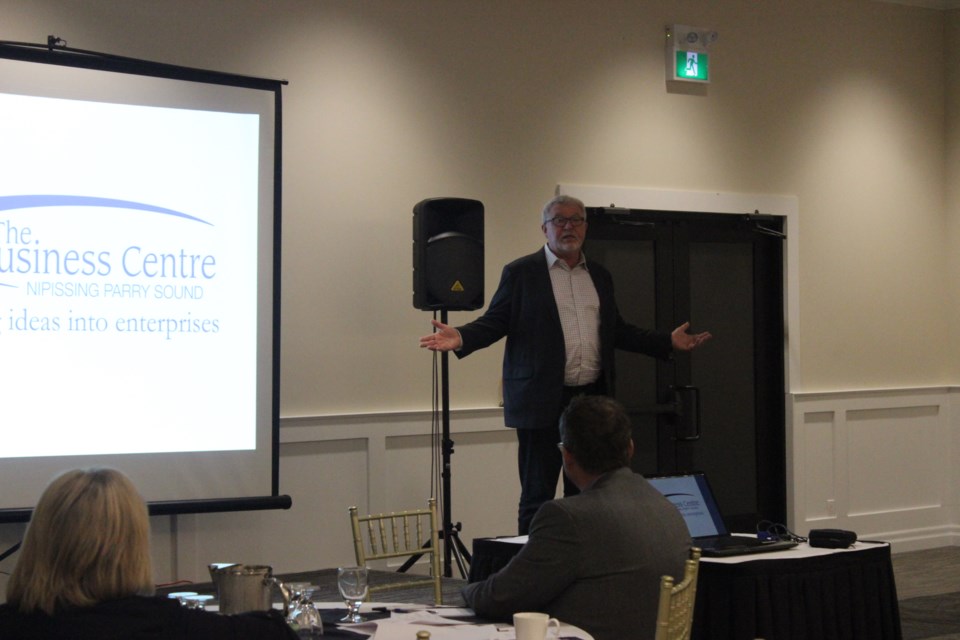For Mark Wafer, owner of six Tim Hortons restaurants in Toronto, having an inclusive workforce for those with disabilities has been both a positive and profitable experience for his businesses, a case he made Wednesday morning during The Economic Case for Inclusion Event.
“You get out of school, you graduate,” he prefaced, mentioning Ontario’s high enrolment for students with disabilities. “Remember how long it took you to get your first job, a week, two weeks, maybe a month? You know how frustrating it can be. Imagine how much more difficult that’s going to be if you have a disability.”
Wafer, who is deaf, understands the barriers often faced by individuals with disabilities—especially in the workplace.
“Today people with disabilities endure a perpetual depression. Why is that? Because hiring managers, HR departments, CEO’s believe in myths, perceptions and stereotypes around hiring somebody with a disability,” he explained. “It cost too much money, productivity is going to be affected, their workplace will lack innovation, and they’ll require more supervision and so on. So in essence, the greatest barrier a person with a disability faces when trying to get into the workplace is attitude.”
Wafer said these stigmas come from the perpetual expression that individuals with disabilities need our charity, when in actuality, he believes all that is needed is the opportunity to prove their capabilities in the workplace.
In order to make changes in the private sector, Wafer said we needed to make apparent how being inclusive impacts revenue for the company in a positive way. He said when he started out 21 years ago, his clientele was growing and how the limited number of staff were struggling to keep up with the demand when one day a particular individual entered his business looking for a job.
“The man who walked through that door was a young man, by the name of Clint Sparling and he has Down syndrome,” Wafer said. “I knew, because of the barriers placed in front of me when I was young, if he was knocking on doors, he wouldn’t get a job. So I gave him a chance.”
According to Wafer, Sparling quickly became one of his best employees, coming to work early, not wanting to take breaks, and wanting to stay at work longer than his shift. He also took great pride in his job and his uniform, always polishing his shoes, ironing his pants and pressing his shirt—a habit that quickly inspired his coworkers to improve their own commitment to keeping their uniforms proper.
He explained how not only did Sparling seldom call in sick, but he inspired coworkers and is still with the company after all this time.
“In an industry with an employee turnover rate of about 100 percent, my businesses is less than half the norm and it’s because of how much more inclusive and inspiring the workplace is,” he said. “And innovation isn’t only about hiring intelligent individuals, but people with different perspectives. A person with a disability needs to find alternatives to ways other might do, meaning they think differently.”
During a similar presentation to the one he gave Wednesday morning, he said a young lady approached him asking him for a job, however, she was profoundly deaf. At the time Wafer had recently renovated one of his locations with a tandem station, which allowed two team members to process and prepare orders during exceptionally busy times.
“I asked to see her resume and found she had graduated three years prior from Queens University with an MBA and had never worked for the three years. Imagine that,” he said, “in the city of Toronto, having an MBA and never working for three years.”
Wafer said, however, the position only offered three hours a day for a total of 15 hours a week and he wouldn’t simply increase her hours for the sake of it. He was an employer and needed a service and as he had previously said, people with disabilities don’t need charity, but only the opportunity.
And it didn’t take long for that opportunity to come for her when the position of baker became vacant.
“She applied for the job,” he said. Now the ovens in Tim Hortons work on audible warning and most employers would have told her she couldn’t because she was deaf. However, I told her to take an hour in the kitchen to figure out how she’d get the job done because somebody with an MBA wouldn’t waste their time applying for a job they couldn’t do.”
“Fifteen seconds later, she came back with two questions: what the audible warning was for and what the timers were for,” Wafer said. “When the buzzer goes off, it’s time to take the product out of the oven and when the timer hits zero it’s time to take the product out. I’m deaf too and I hadn’t figured that out!”
As a result of her alternative approach to a situation, she got the job and productivity in the bakery increased more than before after a short time.
During his presentation, Wafer said the numbers and his experiences in employing 120 individuals with disabilities over the past 20 years. Currently, 46 people with disabilities fill his workforce of 250.
“My expectations are exactly the same for everyone," he said. "Just do the job to the best of your abilities.”



